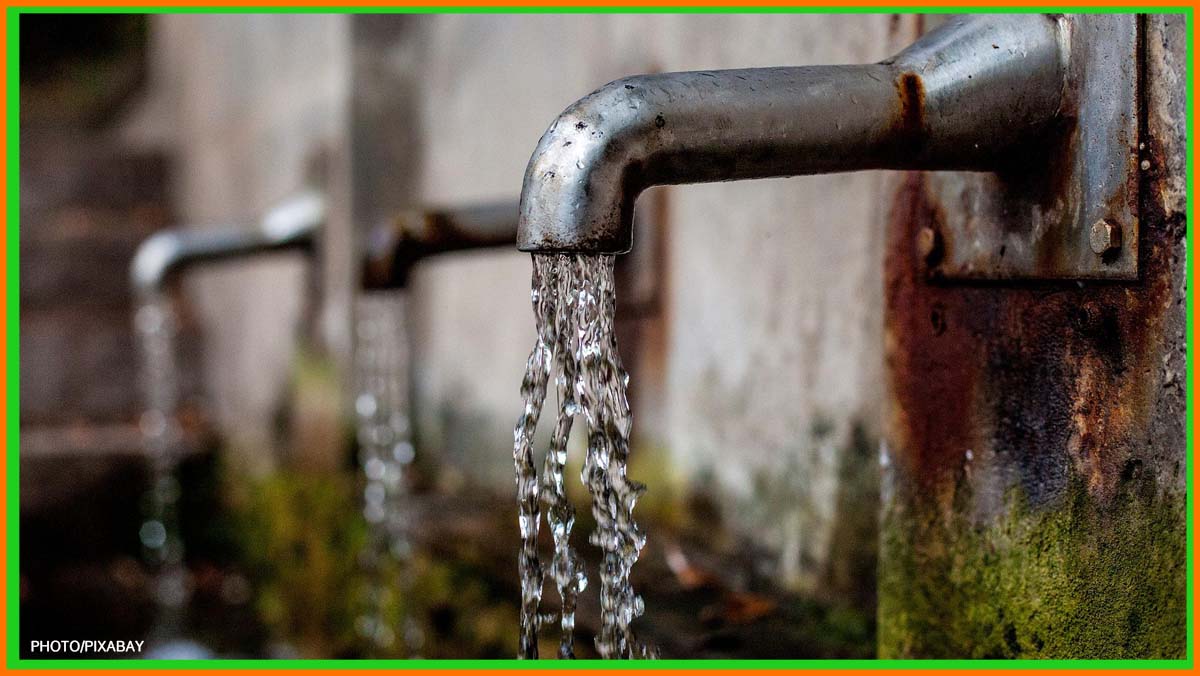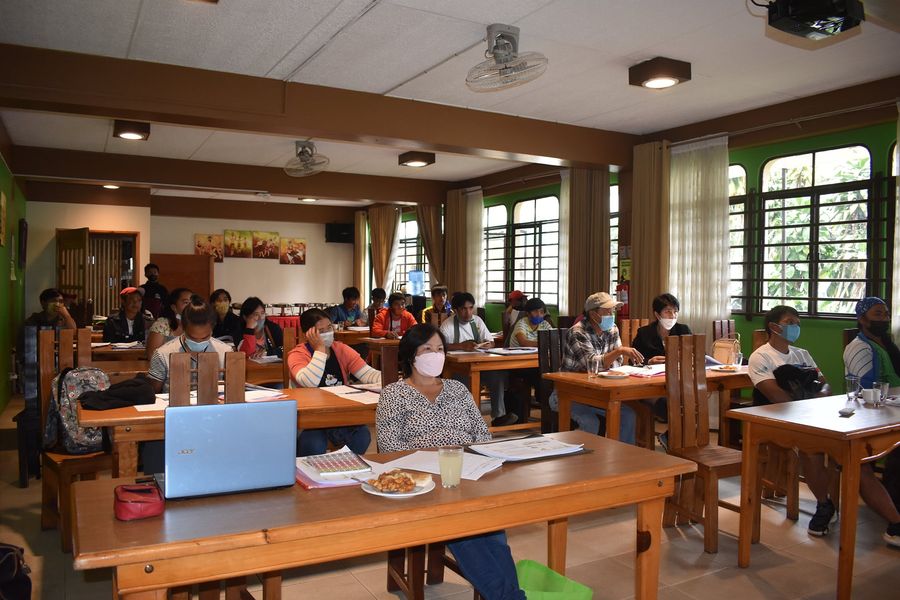BONTOC, Mountain Province – Two municipalities in the Cordillera benchmarked on Bontoc’s best practices on Disaster Risk Reduction and Management (DRRM) and climate change adaptation on March 31-April 1, 2022.
The two delegations comprised the municipal department heads and municipal employees, barangay officials, Sangguniang Kabataan officials, representatives from the civil society organizations, people’s organizations, and community-based organizations from Pinukpuk, Kalinga and Itogon, Benguet. Also, the Municipal Local Government Operations Officer of Pinukpuk as a representative of the Department of the Interior and Local Government was present.
In his welcome message, Mayor Franklin Odsey expressed his gratitude to the two municipalities and the organizers of the cross-learning visit – the Adventist Development and Relief Agency (ADRA) and Humanity & Inclusion (HI) – for recognizing the efforts of the municipality on DRRM and climate change adaptation.
The mayor credited the accomplishment of the present administration to the collective effort of the workforce of the municipal government, partner agencies, and stakeholders, with the support of the Bontoc community.
He added that the cross-learning visit is a venue for the municipalities of Pinukpuk and Itogon to exchange best practices on DRRM and climate change adaptation with the municipality of Bontoc.
HI Project Officer Monaliza Baccay mentioned that EMPOWER (Empowering Municipalities, Barangays, Civil Society Organizations, and People’s Organization through Working Together to Enhance Disaster and Climate Risk Governance) is a 30-month consortium project of the ADRA and HI, funded by the European Union.
Baccay and ADRA Project Manager Geraldina Gutierrez both explained that Bontoc was chosen as the area for the cross-learning visit because of the awards accorded to the municipality. The municipality has been a consistent Seal of Good Local Governance (SGLG) awardee from 2017 to 2019.
It is also one of the four local governments in the Cordillera and the only municipality of Mountain Province to have been rated beyond compliant (Excellent) for the exemplary performance of the organization in the advocacy and implementation of a comprehensive DRRM through its dynamic and results-oriented leadership in pursuit to attaining a safer, adaptive and resilient Cordillera.
Relative to this, the Municipal DRRM Council through the MDRRM Office showed three audio-visual presentations that encapsulate the municipality’s undertaking focusing on the four thematic areas to include Disaster Prevention and Mitigation, Disaster Preparedness, Disaster Response, and Disaster Rehabilitation and Recovery. The presentation highlighted the innate spirit of og-ogfo or bayanihan of which during most difficult times, the generosity of everyone is evident. It showcased the dedicated community partnership among barangay leaders and community members for effective community response where the community comes to aid the responders and generously gives whatever they can to help.
Noteworthy is the creation of the MDRRMO from the appointment of one permanent employee in 2015 and has increased to eight permanent personnel, and starting from a small office space, it was provided with a wider space and an Emergency Operations Center with the construction of the Bontoc Municipal Capitol.
The functionality of the council to include the DRMM Plans and Policies were presented incorporating the proper utilization of the 5 percent Calamity Fund.
Among the highlights include the installation of early warning signages along with the flood, landslide-prone areas, sinking areas; installation of convex lens for road safety measures; installation of fire hydrants in Barangay Bontoc Ili as the hose of the fire truck cannot reach the barangay.
Intensified information, education and communication campaigns to all sectors, especially those in the vulnerable sector (senior citizens, pregnant mothers, and persons with disability), were conducted.
The municipal government has allocated funds for the conduct of various life-skills trainings in pursuit of establishing effective and well-trained personnel and rescue teams, and regularly adds and upgrades its various equipment and supplies by making prudent use of the DRRM funds.
To instill disaster preparedness in the community, earthquake drills, fire drills, flood drills, and simulation exercises are conducted.
In response to the COVID-19 pandemic, the municipal government purchased the needed response items which were shared them with the barangays.
Food for the task force, workforce, volunteers, and COVID-19 patients quarantined in the Temporary Treatment and Monitoring Facilities (TTMFs) were likewise provided.
The Bontoc government was able to attain all these undertakings with the support of all partner stakeholders to include the various government agencies and civil society, with the cooperation of the community.
Some of the best practices that were shared were on the Recycling, Solid Waste Management, and Re-greening Project of the Sangguniang Kabataan of Barangay Samoki headed by SK Chairperson Anton Zaren Nasungan, and the environmental sustainability programs, projects, and activities such as tree planting, backyard gardening, clean-up drives, and clean and green campaigns.
This year, the Sangguniang Kabataan (SK) Council of Samoki has raised the bar of excellence at the national level as one of the Top 20 Finalists for the Bayanivation 2.0 Barangay Innovation Challenge.
Out of the 224 barangay-applicants nationwide, Samoki SK Council is the only qualifier in Mountain Province and one of the only three entries in the Cordillera Administrative Region (CAR) that made it to the Top 20. The other two barangays in CAR that earned a place in the Top 20 Finalists are Barangays Pacdal and Irisan, both in Baguio City. Samoki SK Council submitted its entry proposal “Establishing a Seedling Nursery to Produce and Plant Local Tree Seedlings That Improve Water Production and Help Treat the Local Water Source”. The nursery will be located in Tuchey, Samoki, near the water source of the said village.
Bayanivation is a nationwide program that aims to spark civic innovation and digital transformation in local governance in the Philippines, while Bayanivation 2.0: Barangay Innovation Challenge is designed to empower barangay leaders to create innovative, impactful, and replicable solutions to local challenges.
The Samoki SK came up with the proposal as the community always experiences a shortage of supply of water for households and the rice fields due to damaged and leakage in water pipes caused by landslides, especially during the rainy season.
Likewise, there are instances the Samoki SK council experienced a shortage of seedlings in their tree planting activities, thus with the establishment of a tree nursery, ample supply of seedlings is assured and the tree planting activities will be a sustainable and continuing program in the barangay with the replanting of areas in the village susceptible to landslides.
On DRRM programs, the Samoki SK allocated from its budget the conduct of training on Basic Life Support, First Aid, and Mountain Search and Rescue. The proper allocation and utilization of the SK Fund are attributed to the collective efforts and commitment of the Office of the Municipal Budget Officer, Office of the Municipal Treasurer, Office of the Municipal Planning and Development Officer, and Office of the Municipal Disaster Risk Reduction and Management Officer in going around the barangays to conduct budget orientations every year before the preparation of barangay budgets.
Likewise, the Office of the Municipal Budget Officer and Office of the Municipal Accountant provided technical assistance to the Samoki SK Council on the utilization of its fund.
With all the undertakings and accomplishments of the Samoki SK Council, SK Nasungan has been accorded the “SK IDOL Award” by the Environmental Management Bureau of the Department of Environment and Natural Resources in partnership with the National Youth Commission.
The Kaublan Organization, Incorporated (KOI), organised by Samoki women in 1988, shared the best practices of their Watershed and Agro-Forestry.
Recognizing the involvement of women in disaster management and decision making, and trusting their capabilities in financial management and project implementation, the community through the Sangguniang Barangay of Samoki endorsed the KOI to represent the village to enter into a contract with the DENR in the implementation of the Integrated Natural Resources and Environmental Management Project in 2016.
The organization was able to cover 19 hectares of land in Samoki of which three hectares were accommodated for agroforestry while the remaining 16 hectares were reforested.
With the 16 hectares reforested, an estimated 8,000 pine tree saplings were planted, of which an estimated 6,624 pine trees survived, or equivalent to an 82.8 percent survival rate.
For the three-hectare agroforestry covered by the project, 1,200 fruit-bearing saplings were planted of which 936 have survived, or equivalent to an 80.25 percent survival rate. The fruit-bearing saplings include guyabano, mango, avocado, and macopa.
With the effective, efficient, and transplant implementation of the project, the KOI was accorded a Certificate of Recognition from the DENR-INREMP for being one of the Best Performing People’s Organizations in the implementation INREM Project within BAAGMADOLI Watershed Management Unit in 2018. In the same year, the Asian Development Bank as the lending financing institution partner of the DENR-INREMP conducted a site visit in the area.
Likewise, the KOI received a Certificate of Accreditation as a people’s organization in 2019 based on the Interim Standard for DENR Accreditation of People’s Organizations. As such, the KOI is qualified to access the Integrated Natural Resources and Environment Management Project and other current and future DENR programs and projects in Mountain Province.
In 2020, the organization was a grateful recipient of Asexual Propagation Training to further enhance the knowledge of its members on agroforestry and reforestation with the project site being visited by the International Center for Research in Agro Forestry.
With this, the KOI is looking forward to a continued partnership with the DENR, the municipal government, and other partner stakeholders in the implementation of climate change mitigation and DRRM programs, but for now, they continue to implement maintenance and protection activities in the areas covered by the project.
During the open forum, the participants lauded the initiatives and undertakings of the Bontoc in the involvement of all the sectors in the implementation and attainment of the DRRM and climate change adaptation programs, projects, and activities.
Both delegations, especially the barangay officials and SK officials ,remarked that they have learned DRRM practices and climate adaptation initiatives they will replicate and implement in their respective barangays.
In closing, MDRRM Officer Johanna Padaen thanked the delegation of Pinukpuk and Itogon, and the organizers for recognizing Bontoc’s best practices on DRRM and climate change adaptation.
Also present during the cross-learning visit are Samoki SK Council members, KOI President Nida Cherwaken, barangay officials from the four central barangays, and members of the Bontoc MDRRMC.














